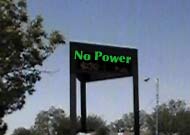Our gospel did not come to you in word only, but also in power and in the Holy Spirit and with full conviction ... (1 Thessalonians 1:5 NAS)
I went to a local school council (LSC) meeting at my son's school this week. The LSC is made up of parents, teachers, the school principal, and a community representative. The LSC makes many of the decisions about what goes on in the school. It approves expenditures, helps determine curriculum, and serves in an advisory and regulatory capacity. I'm not on the council, but its monthly meetings are open and I like to go to stay informed about what's going on at Joshua's school.
Anyway, one of the topics up for discussion at this month's meeting was an electronic marquee - one of those electronic signs that scroll messages. The principal had put in a request with the Chicago Public School system for a marquee to go outside the school building. She reported some good and bad news to the LSC. The good news was that Chicago Public Schools had approved her request. We can have an electronic marquee for the school. The bad news was that there's no money to pay an electrician to run power to the sign.
Exactly. What good IS an electronic marquee with no power? It would be useless. Worse than useless; those things aren't very attractive, so without power it would just sit on the side of the school building and look ugly. Our principal wisely declined CPS's "generous" offer.
The conversation got me thinking. I wonder if one of the reasons people decline God's generosity is that they don't see the power of the gospel. How could they, when the gospel hangs blank and powerless on so many "religious" people?
Far too many of us live in ways that declare the gospel to be empty of power - unable to change even one life to the smallest degree. In the Bible, Paul warned Timothy about people who would have "a form of godliness, although they have denied its power" (2 Timothy 3:5 NAS) Their lives are empty of any indication that their "godliness" actually made them more like God. Unfortunately, I think I've met some of the people he was talking about. Maybe you have, too.
It's easy, isn't it, to make the gospel of Jesus into something to talk about in religious settings? We too easily reduce it to a collection of words, a religious vocabulary with which we frame debates, remind ourselves of God's faithfulness, and reassure other Christians of our orthodoxy. But, for too many of us, that vocabulary seems to make little difference in our lives. Despite our knowledge of and familiarity with the vocabulary of the gospel, we still find ourselves powerless against sin. Paralyzed by fear. Pain tears through our hope like wet tissue paper. Anger and hatred seethe untouched in our hearts.
Though communicated by words and defined with words, the gospel is not just about words any more than metal, plastic, and silicon make that electronic marquee what it is.
The words of the gospel communicate its reality and frame it in a way we can understand, but the gospel is really an act of God. It is God giving his Son for the redemption of the world. It is Jesus' offering of himself on the cross and his resurrection from the dead. It is the Holy Spirit being given to every person who is truly a disciple of Jesus. The gospel is the act of God to transform human beings and to make us new creations. And when that act of God is embraced, God himself bursts into our lives bringing power and conviction. We're made new. We're transformed. And all the world can read, in bold, bright letters what God is doing in our lives.
If it's difficult for anyone to tell by looking at your life that you're a believer, then may I suggest that the problem might be that you've embraced a gospel of mere talk. You've been taught to think that faith is believing in a series of propositions: Jesus died for my sins, Jesus rose on the third day, and so on. Understand, you're right to believe that those words matter. They do. But they only matter because they describe what God has done and is doing. They describe the events in which the saving power of God came to human beings.
We need, perhaps, to realign our faith. To believe, not in words, but in the powerful God to whom our words point. We can try to describe him, but in the end he defies description. We can try to systematize him, but ultimately he resists systematization. He blows up our categories, exceeds our imaginations, bursts out of the constructs in which we try to contain him. In the end, it's best for us to recognize that what we really need to do is put our trust in him and invite him into our lives and hearts to do what he will with us.
A powerless gospel is quite possibly worse than no gospel at all. In a world than needs to read the work of God in our lives, a powerless gospel leaves us dark and without a message. But, good news - unlike the Chicago Public School system, God doesn't leave anyone powerless. Ask him to live in you, change you, make you powerful, and he will. His Spirit pulses with power, and he wants your life to shine with it. Put in your request and watch it happen.










Comments
Have thoughts on this article? Leave a comment